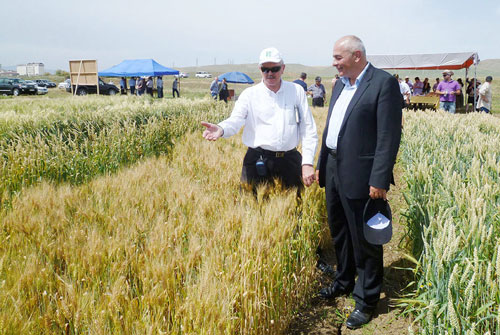By Alexei Morgounov/CIMMYT
Georgia has high soil fertility and good agro-environmental conditions for growing wheat, yet the country imports most of the grain it needs. To help make Georgia’s agriculture sector more self-sufficient, a small workshop and Wheat Field Day were held 7 June at Lomtagora Farm in Marneuli County.
The farm is a focal point in Georgia for the testing and adoption of winter wheat germplasm supplied by the International Winter Wheat Improvement Program, a joint project of the government of Turkey, CIMMYT and the International Center for Agricultural Research in the Dry Areas (ICARDA). Several high-yielding varieties have been identified, multiplied and delivered to the farming communities in the country. During the field day, participants saw more than 70 varieties and breeding lines demonstrated on big plots and submitted seed requests for the ones they liked. Traditional Georgian bread was baked from different genotypes including the landraces, and samples were offered to the visitors.

Dr. Kakha Lashki, head of the farm, emphasized the need for technological innovations and varieties to improve farms and increase wheat production. Dr. Alexei
Morgounov of CIMMYT-Turkey presented some of those technological solutions. He also addressed the challenges facing wheat farmers globally. Dr. Ram Sharma of ICARDA-Tashkent spoke about the outcomes of regional cooperation with ICARDA and how they can be applied in Georgia.
This was the fifth year for the Wheat Field Day, and it attracted around 100 participants from across the country.
 Nutrition, health and food security
Nutrition, health and food security